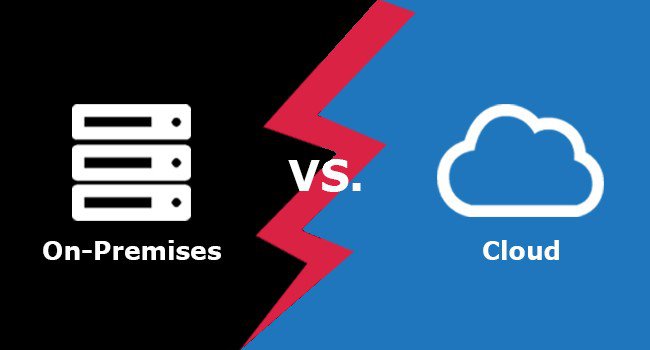
We know cloud offers many benefits over the on-premises for both business and consumer such as accessibility, scalability, security and system reliability. Cloud Computing is known for it’s competitive, comprehensive for business solutions and affordable. The cloud offers the most affordable administrative solutions.
So the real question is that “is the cost of cloud cheaper than on-premises?” Yes, cutting down cost is one of the main architectural checkpoints on the minds of IT professionals, and it is a big deal nevertheless where you host your IT services.
Cloud Computing vs On-premises Cost Comparison
When it comes to the cost of your IT services, there are many factors to consider if you choose either of on-premises or cloud. Let’s look at some of the difference in cost considerations for cloud vs. on-premise costs.
On-Premise Cost Considerations:
- Hardware requires an initial upfront cost
- High-availability requires the purchase of redundant hardware
- Need to bear electricity expenses
- Need to make an upfront payment for software licenses
- Recruitment of Multiple IT staff essential
- Expensive compared to the cloud in terms of scalability, expertise, redundancy, etc

Cloud Computing Cost Considerations:
- Cost is inexpensive compared to on-premises servers, but in the long run, the cloud can be expensive if not governed properly
- The cost to scale is less than on-premises
- If you stop paying for the services in the cloud, they might suspend the services until completion of payment
- The need for IT staff is less compared to on-premises
- Has a cost model to pay as you use
- Multiple ISP connections are needed to ensure redundancy
How is Cloud Cheaper than On-Premise?
If you have hosted the current data center in your premises it may cost more than the cloud in the number of ways, some of them are listed below:
Hardware
In an on-premises data center, the organization has to purchase hardware by making an upfront payment, and the server hardware is not inexpensive. Server hardware might include storage, processor, fan, etc and the investment in such component is not just one time as there will always be a need to improve by upgrading the components to the latest technology. Such purchases of hardware and maintenance need a large investment. Compared to the on-premises, the cloud offers an efficient way to save money as there is no need to purchase any equipment. The servers can be launched within minutes, and we only pay for the service that we have used. This cost is much lower having your own data center.
Software
In on-premises, one has to buy the software license that is compatible with the hardware and for the business needs software license can be expensive. Just like hardware, the software update has to be done regularly. The organization needs to pay for an updated license every year. While in the cloud, the software will be automatically updated from the backed by the cloud providers. Cloud doesn’t charge additional cost for the software updates that they provide.

Data Recovery and backup
You are fully responsible for the back up of important data in the on-premises server. Many organizations offer data backup and recovery services to the business, which is another expense one has to consider. They also might take some time to recover data in the event of an emergency. In the cloud, there is no need to have separate assistance for data back up, and recovery as the cloud provider is accountable. Backing up data in the cloud is highly recommended for the business. Cloud offers automatic back up of all the data daily, and the cost is much lesser compared to on-premise.
HVAC (Heating, Ventilation and Air Conditioning)
HVAC is a technology that provides a comfortable environment for smooth operations of the hardware. In the on-premises data center, one has to consider HVAC technology as well since the cooling of hardware should be done 24×7 throughout the year. If not, components will be damaged due to heat. Cloud offers this at no additional cost as the infrastructure administration is taken care of by the cloud service provider.
Security
When it comes to security, it is a debate between two sides. Some believe on-premises is invincible and some say cloud is the way to go. There is no right answer. Cloud providers have invested their idea of providing a high level of security to their customers since their business depends on it. For example: Would you place your prized possession in the vault that has headlined in the newspaper? Absolutely not and since there are many top companies (Netflix, Vodafone, Adobe) running in the cloud proves that cloud is right all along.
IT Staff
The traditional data center needs to hire multiple professional to take care of the servers, room temperature, maintenance of hardware/software, etc. The cost of IT staffing is reduced in the cloud since the cloud service providers take care of infrastructure administration.
Mobility
With the implementation of the cloud, one can access the dashboard of information from any mobile device and eliminates the need for physical presence in the data center.
Summary
Since we have seen the cost of cloud computing vs on-premises, one can easily conclude the benefits that we get from the cloud and should move with the utmost care and meticulousness.
About InterPole
InterPole was established in 1996 and has been engaged in web hosting, email, and management of IT infrastructure. InterPole pioneered with Virtual Private Servers in 2004 and Cloud Hosting in 2008. Over the years, InterPole has worked with over 6200 mid-sized businesses and startups, and have assisted them in their journey towards the adoption of modern technologies through the Internet. InterPole is a Standard Consulting Partner of Amazon AWS and Microsoft Azure. With this partnership, provides Managed AWS service and maintains a team of engineers who are trained and certified for the specific cloud platforms. These benefits companies in defining their cloud strategy and making a well-planned journey, reliably and cost-effectively.

